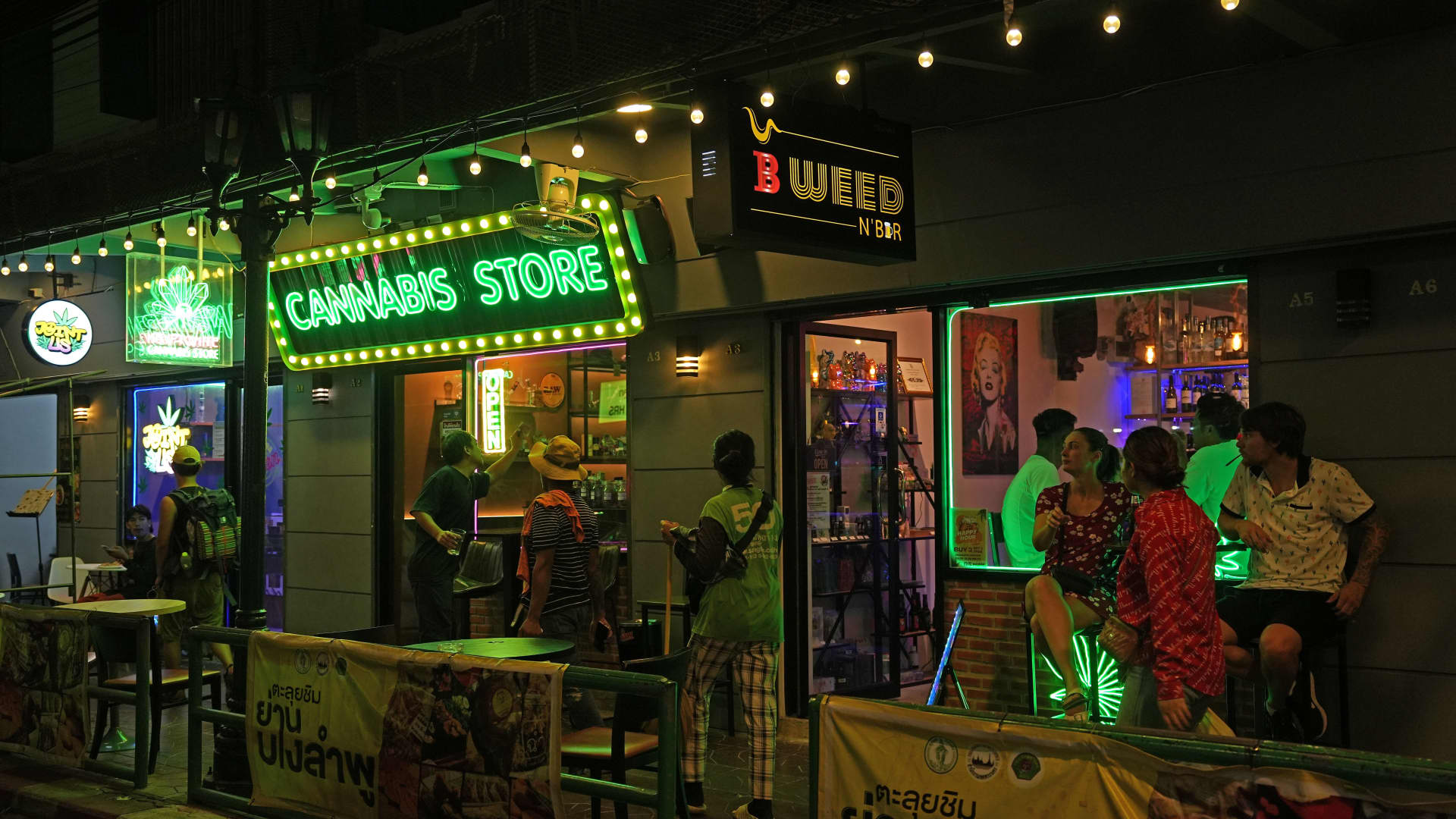A cannabis store along Khao San Road in Bangkok, Thailand, on Sunday, Sept. 10, 2023. Thailand decriminalizing cannabis before passing the bill to regulate wider uses of the plant, has led to a mushrooming of over 4,500 dispensaries all over the country.
Dimas Ardian | Bloomberg | Getty Images
More than a year after Thailand legalized the recreational use of marijuana, the country’s new prime minister plans to roll back that law in an attempt to end the current glut in the market and bring long-term benefits to the industry.
In June 2022, the Southeast Asian nation became the first in Asia to decriminalize the cannabis plant, allowing it to be grown and consumed freely. Since then, the weed market has turned free-for-all as various businesses entered the sector with little regulatory or consumer guidance to oversee such activity.
Thai cities are now home to scores of dispensaries, many of which sell recreational products containing more than the legal amount of 0.2% tetrahydrocannabinol (THC) content allowed.
Moreover, not every shop has the required license and while the law stipulates that cannabis can only be consumed by individuals aged 20 and above, that’s not always enforced.
All this has sparked major backlash from locals who have been calling for tighter legislation. In a recent interview with Bloomberg, Prime Minister Srettha Thavisin, who took office last month, said his administration would limit cannabis use to medicinal purposes only.
Presently, the market is quite chaotic, with many not adhering to any standardized rules.
Soratat Pongsangiam
president, Greenhead Clinic
“The law will need to be rewritten,” Srettha said. “It needs to be rectified. We can have that regulated for medical use only,” he said.
Speaking separately to Reuters, he said “drug abuse is a big problem for the country” and that he disagreed with the recreational use of cannabis.
New rules welcomed
Many industry experts say they welcome stricter laws because it would help avoid an oversupply in the market and end misconceptions of cannabis as a recreational drug rather than a medicinal substance.
Traditional Thai medicine has long used cannabis as an ingredient in various remedies for holistic health.
“As it stands, the market is oversaturated with cannabis that hasn’t undergone proper lab testing,” explained Soratat Pongsangiam, president at Greenhead Clinic, a traditional medical clinic in Phuket.
“This oversupply has resulted in a substantial drop in prices, down by 50-60% since we first began. If stricter regulations are implemented, it could potentially restore credibility and control to the industry,” he said.
“Presently, the market is quite chaotic, with many not adhering to any standardized rules.”
He expects an outright ban on vape products plus extractions like oil and wax. Cannabis shops may also have to deliver mandatory monthly sales reports to monitor the type of products being sold and to whom, he added.
“I foresee a crackdown on unlicensed pop-up shops that currently evade taxes and bypass necessary quality controls and registration processes,” he said.
“The industry would like to see clear regulations, and they want it restricted for medical purposes,” echoed Sornkanok Vimolmangkang, an associate professor specializing in plant sciences at Bangkok’s Chulalongkorn University.
Deputy Prime Minister Anutin Charnvirakul, leader of the Bhumjaithai party and one of Srettha’s coalition partners, was a key figure responsible for legalizing recreational cannabis.
At the time, he strongly believed that decriminalization would benefit the population but he’s since called for tighter industry monitoring amid the ongoing debate over unregulated usage. Ultimately though, he said he does not wish for the marijuana plant to be reclassified as a drug.
Anutin, who is also the country’s health minister, will not let cannabis return to the narcotic list, Sornkanok said. “There would be a way to compromise the regulations to minimize aggressive feedback among coalition parties.”
Social stigma
With cannabis now in wide circulation, often for hedonistic purposes, health experts say that’s deterred some patients from using it for medical purposes.
Currently, many outlets claim to be medical cannabis platforms but they often prioritize profits rather than patient health, a number of clinics told CNBC. That diminishes the reputation of legitimate facilities as the lines blur between clinics and dispensaries.
Dr. Jintana Manorompatrasal, founder of Bangkok-based Sawasdee Clinic, which specializes in alternative medicine, said there’s an urgent need to instill greater confidence among patients seeking cannabis treatment.
“This could foster a more positive perception of the cannabis industry among the public, and for the industry to sustain in the long run,” Jintana said. “From a medical provider’s standpoint, stricter measures could also highlight the need for more study and research.”
However, before the laws change, there needs to be a discussion on how to support local growers, producers and dispensaries to soften the impact of any new regulation, she warned.
Exporting cannabis
Before May’s general election, Anutin was quoted as saying Thailand could become an exporter of cannabis products to legal foreign markets like the U.S. This could very well happen under Srettha’s new proposed law, some market watchers said.
“The prospect of exporting cannabis products to legal foreign markets aligns with Thailand’s medical hub policy propelling both medicinal cannabis and other traditional herbs to the forefront,” said Jintana.
“The entire industry — from growers, extractors, researchers, and service providers — [holds] immense potential for growth and advancement, given the right market support. Such support could translate into higher quality plants, a wider array of varieties, enhanced product development, and increased innovation.”
It’s vital to establish clear and stringent laws at this juncture to steer the industry towards a sustainable path.
Soratat Pongsangiam
president, Greenhead Clinic
Others, however, remain more skeptical.
Vimolmangkang of Chulalongkorn University said quality standards must be improved to meet international export standards at a relatively lower price. “It’s challenging,” she added.
Ultimately, clear regulations are needed to ensure there is enough business for growers.
“It’s vital to establish clear and stringent laws at this juncture to steer the industry towards a sustainable path,” said Pongsangiam from the Greenhead Clinic.

